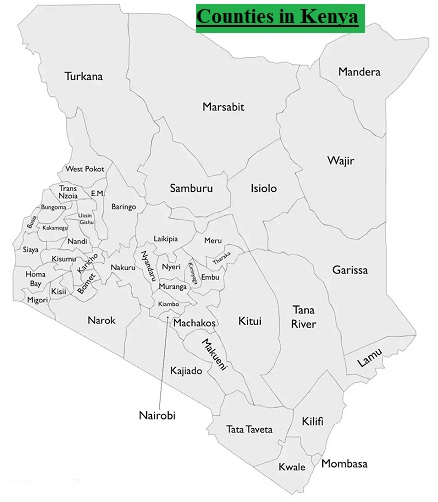Objectives and principles of Devolved Government
Devolved Government is when a National Government gives power to a group or organization at a lower or more local level. In Kenya, the devolved units are the counties. Kenya has 47 counties.
Objectives of Devolution in Government
- Foster National Unity within the regional diversity.
- Facilitate decentralization of state organs, their functions and services from the capital of Kenya
- Promote democratic and accountable exercise of power.
- Give new powers of self-governance to the people and enhance the participation in decision making.
- Ensure equitable sharing of National and local resources throughout Kenya.
- Promote social and economic development
- Recognize the rights of communities to manage their own affairs.
- Enhance checks and balances and the separation of powers.
Principles of Devolved Government
- County government shall be based on democratic principles and the separation of powers
- County government shall have reliable sources of revenue to enable them to govern and deliver services effectively
- No more than two-thirds of the members of representative bodies in each county government shall be of the same gender
Structure and Functions of County Governments
A county is the system of government that oversees the administration of a county. This government enacts legislation at the county level and oversees its implementation. However, it works hand in hand with the national government.

Structure of the County Government
A county governmemnt has the legislative arm which is the county assembly and the executive arm which is the county executive committee.
County Assembly
The following are the members of a county assembly;
- Elected members by registered voters of the wards
- special seats meant to ensure that not more than two thirds of the assembly membership belong to the same gender
- Representation from marginalized groups (disabled and youth)
- The speaker who is an ex-officio member
A county assembly is elected for a term of five years. It makes laws that are necessary for effective performance of functions of the county government
Some of the duties of the county assembly include;
street lighting, county planning, provision of pre-primary education and village polytechnics, provision of recreation facilities, passing laws to govern the county, fire-fighting and disaster management, and management/exploitatioon of resources in the county
County Executive Committee
The following are the members of a county assembly;
- County Governor
- County Deputy Governor
- Members (CECs/Ministers) appointed by the county governor with the approval of the assembly
The following are the functions of County Executive Committees;
- Implementation of county legislation.
- Manage and coordinate the functions of the county administration and its departments.
- Perform any other functions conferred on it by the constitution or national legislation.
- Prepare proposed legislation for consideration by the county assembly.
- Provide the county assembly with full and regular reports on matters relating to the county
Relationship Between National and County Governments
The Constitution of Kenya clearly defines the functions and powers of the national and county government.
A function or power of government at one level may be transferred to another level if it will be more effectively performed by the receiving government.
Counties receive money from the national government.
Some of the services allocated to national government include;
- Defence
- Foreign Affairs
- Citizenship and immigration
- Criminal laws
- Correctional services
- Economic policy and planning
- Intellectual property rights
- Labour standards
- Housing policy
- Public investment etc.
The county governments are allocated services like;
- Agriculture
- Health
- Pollution control
- Cultural activities
- Trade development and regulation
- Animal control and welfare etc.
Elections for both national and county assemblies are held on the same date supervised by the Independent Electoral and Boundaries Commission (IEBC).
The functional and institutional integrity of government must be respected at every level.
In case of dispute between the two levels of government, attempts should be made by both governments to solve the dispute in accordance with the law.
Objectives and principles of Devolved Government
The county governments in Kenya have been facing a myriad of challenges as follows;
- High population in some counties
- Disagreements over the headquarters of the county
- Poor planning by county leaders
- Lack of qualified personnel to run affairs of a county
- Political interference in the running of county affairs
- Lack of information on how county government operates
- Lack of adequate facilities
- Misappropriation and mismanagement of funds through corruption
- Inefficient system of tax collection
